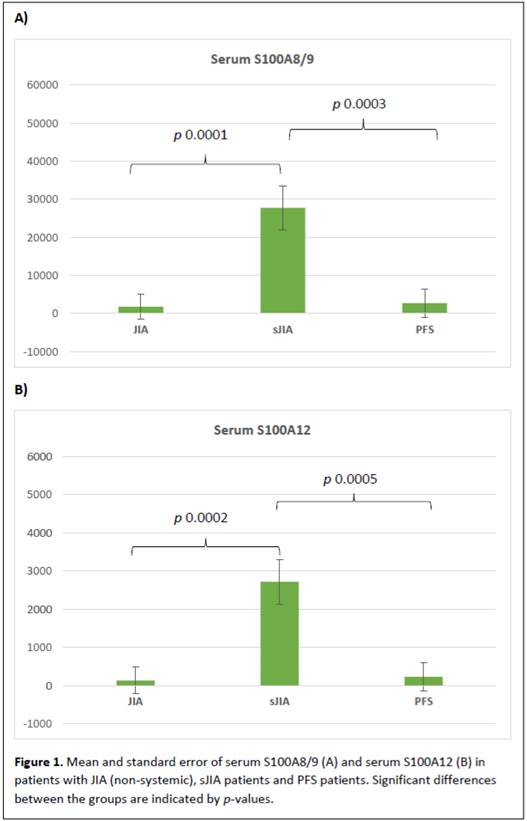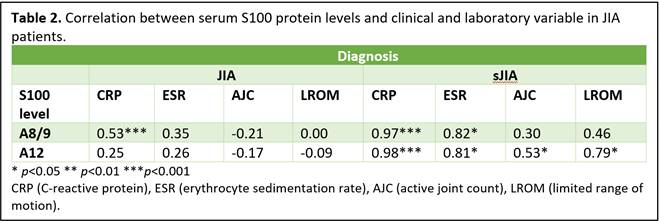Session Information
Date: Monday, October 22, 2018
Session Type: ACR Poster Session B
Session Time: 9:00AM-11:00AM
Background/Purpose: S100 proteins are calcium-binding proteins of increasing value as biomarkers in various inflammatory conditions (e.g. autoinflammatory diseases, vasculitides, inflammatory bowel disease). The two highly studied members in this family; S100A12 and S100A8/9 complex have been proven useful as diagnostic markers. Our study evaluated the utilization of S100 proteins in the clinical setting. We studied the correlation between those markers and other widely used inflammatory markers, disease activity, medication use in our JIA population.
Methods: Subjects were patients seen at the hospital’s specialty clinics (mainly rheumatology) who had S100 proteins tested at some point during their care. The lab reports S100 proteins results as a numeric value above zero. Obtaining S100 proteins is considered part of clinical practice in our institution in the investigation of certain inflammatory conditions. This is a relatively recent addition to practice, and therefore, there are no standard guidelines on specific indications and follow-up tests. A retrospective chart review was performed to collect data on serum S100 protein levels, other inflammatory markers and disease activity. Descriptive statistics were calculated for all variables. SAS software was used to perform all analyses. For continuous variables, mean and standard errors are reported, and comparisons were calculated using two-sample t-tests. For categorical variables, frequency and percentage are reported. Correlation was studied using Pearson Correlation Coefficient.
Results: A total of 118 patient charts with S100 protein levels were reviewed. most patients have a diagnosis of JIA. Patients with systemic JIA (sJIA) had higher levels of S100A8/9 and S100A12 compared to patients with non-sJIA and periodic fever syndrome (PFS) (Figure 1). Correlation analysis revealed strong correlation between CRP and S100A8/9 as well as S100A12 in sJIA patients. S100A12 was found to have moderate to strong correlation with disease activity in sJIA patients. However, other variables including disease activity showed weak to moderate correlation (Table 2).
Conclusion: S100A8/9 and S100A12 were found to be particularly elevated in sJIA patients with a strong correlation with concomitant CRP values. Elevated S100A12 was linked to disease activity in sJIA patients. More data points are needed to delineate correlation between disease activity over time and S100 proteins. S100 proteins can serve as markers to aid in the diagnostic work-up of fever and sJIA and potentially disease activity monitoring in JIA.
To cite this abstract in AMA style:
Aljaberi N, Merritt A, Grom A, Schulert G, Huggins JL, Henrickson M, Brunner HI. The Utilization of S100 Proteins Testing in Pediatric Rheumatology Patients in a Tertiary Care Institution and Implications for Care [abstract]. Arthritis Rheumatol. 2018; 70 (suppl 9). https://acrabstracts.org/abstract/the-utilization-of-s100-proteins-testing-in-pediatric-rheumatology-patients-in-a-tertiary-care-institution-and-implications-for-care/. Accessed .« Back to 2018 ACR/ARHP Annual Meeting
ACR Meeting Abstracts - https://acrabstracts.org/abstract/the-utilization-of-s100-proteins-testing-in-pediatric-rheumatology-patients-in-a-tertiary-care-institution-and-implications-for-care/


